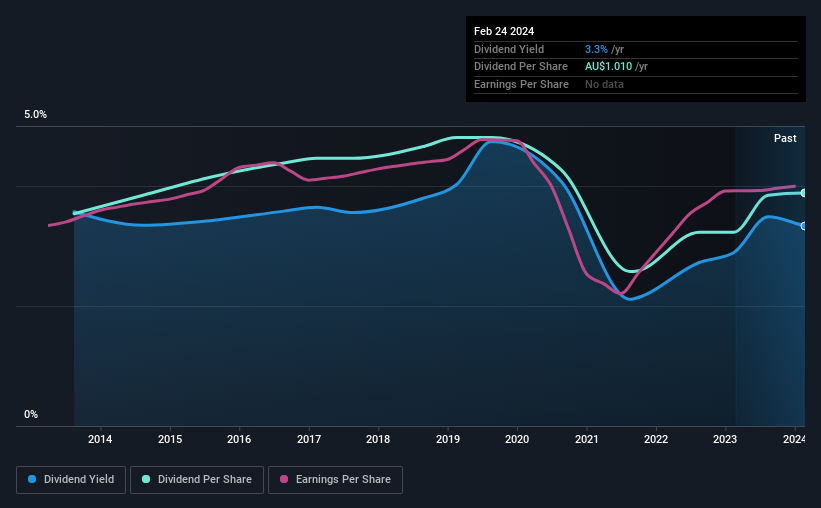Why It Might Not Make Sense To Buy Carlton Investments Ltd. (ASX:CIN) For Its Upcoming Dividend

Regular readers will know that we love our dividends at Simply Wall St, which is why it’s exciting to see Carlton Investments Ltd. (ASX:CIN) is about to trade ex-dividend in the next 4 days. The ex-dividend date occurs one day before the record date which is the day on which shareholders need to be on the company’s books in order to receive a dividend. The ex-dividend date is important as the process of settlement involves two full business days. So if you miss that date, you would not show up on the company’s books on the record date. In other words, investors can purchase Carlton Investments’ shares before the 29th of February in order to be eligible for the dividend, which will be paid on the 18th of March.
The company’s next dividend payment will be AU$0.41 per share. Last year, in total, the company distributed AU$1.01 to shareholders. Based on the last year’s worth of payments, Carlton Investments has a trailing yield of 3.3% on the current stock price of AU$30.30. If you buy this business for its dividend, you should have an idea of whether Carlton Investments’s dividend is reliable and sustainable. That’s why we should always check whether the dividend payments appear sustainable, and if the company is growing.
See our latest analysis for Carlton Investments
Dividends are usually paid out of company profits, so if a company pays out more than it earned then its dividend is usually at greater risk of being cut. Carlton Investments is paying out an acceptable 70% of its profit, a common payout level among most companies.
Companies that pay out less in dividends than they earn in profits generally have more sustainable dividends. The lower the payout ratio, the more wiggle room the business has before it could be forced to cut the dividend.
Click here to see how much of its profit Carlton Investments paid out over the last 12 months.
Have Earnings And Dividends Been Growing?
Companies that aren’t growing their earnings can still be valuable, but it is even more important to assess the sustainability of the dividend if it looks like the company will struggle to grow. If earnings decline and the company is forced to cut its dividend, investors could watch the value of their investment go up in smoke. It’s not encouraging to see that Carlton Investments’s earnings are effectively flat over the past five years. We’d take that over an earnings decline any day, but in the long run, the best dividend stocks all grow their earnings per share.
The main way most investors will assess a company’s dividend prospects is by checking the historical rate of dividend growth. In the last 10 years, Carlton Investments has lifted its dividend by approximately 0.9% a year on average.
The Bottom Line
From a dividend perspective, should investors buy or avoid Carlton Investments? Earnings per share have not grown at all, and the company pays out a bit over half its profits to shareholders. This is not an overtly appealing combination of characteristics, and we’re just not that interested in this company’s dividend.
So if you’re still interested in Carlton Investments despite it’s poor dividend qualities, you should be well informed on some of the risks facing this stock. For example, we’ve found 2 warning signs for Carlton Investments (1 is significant!) that deserve your attention before investing in the shares.
If you’re in the market for strong dividend payers, we recommend checking our selection of top dividend stocks.
Have feedback on this article? Concerned about the content? Get in touch with us directly. Alternatively, email editorial-team (at) simplywallst.com.
This article by Simply Wall St is general in nature. We provide commentary based on historical data and analyst forecasts only using an unbiased methodology and our articles are not intended to be financial advice. It does not constitute a recommendation to buy or sell any stock, and does not take account of your objectives, or your financial situation. We aim to bring you long-term focused analysis driven by fundamental data. Note that our analysis may not factor in the latest price-sensitive company announcements or qualitative material. Simply Wall St has no position in any stocks mentioned.

